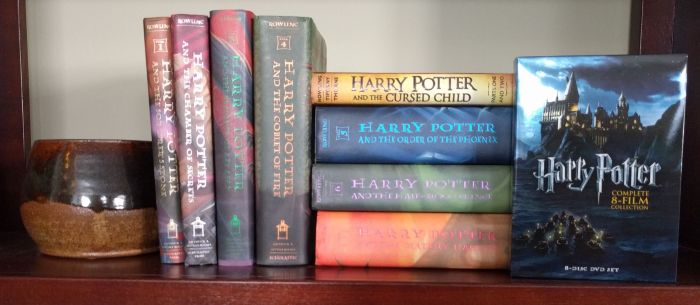
I guess you could say I’m a fan. 🙂
Harry Potter has returned to Hogwarts in search of what he thinks is Voldemort’s final horcrux; meanwhile, Voldemort’s forces prepare to attack the school. Professor McGonagall assures Harry that she and the others will do everything possible to give him time to search. On the steps of the school, she intones “Piertotum Locomotor!” thus calling the statues and suits of armor to their duty of protecting the school. The stone warriors leap from their high perches and thunk to the ground, crouched ready to pounce on the enemy. The professor turns to Mrs. Weasley and giggles, “I’ve always wanted to try that spell!”
I recently reread the entire 7-book Harry Potter series (what fun to lose oneself in such a well-developed world), along the way comparing J.K. Rowling’s words to the images that stick with me from the films (which I watched—again—over last winter’s holidays). The scene above comes from the final movie, Harry Potter and the Deathly Hallows – Part 2, and while it varies a smidge from the book, the movie makers clearly understood the author’s intent and the importance of balancing darkness with light, heaviness with humor.
The Importance of Contrast
Contrast performs several functions. It:
- Maintains audience interest – It’s no news to you that, in any medium, monotony delivers boredom. Visual difference, vocal variety, and emotional highs and lows engage the audience through changing terrain. “What’s over the next hill?” the audience wonders.
- Adds emphasis – Think about a mountain jutting out of the plains. Think of “a very special Blossom” (i.e., a serious topical episode on a sitcom). When the norm is within one range of emotion, thought, or context, and then it suddenly shifts, the change catches the audience’s attention. It says, “Pay attention to me.”
- Offers relief – There are times when we must cover topics that are heavy—topics that make us feel like we are being stifled under a wet, wool blanket in the summer. Periodically, we need to lift the cover for a breath of fresh air.
Contrast as Relief
The use of contrast to offer relief is perhaps somewhat more subtle than the other uses. It infrequently catches my attention, so intrigues me when it does.
The last Harry Potter movie carries a great deal of darkness, visually and thematically, but the creators excelled at inserting contrast into all that darkness. On the eve of battle, we see a combination of imminent danger, fearful power—and childlike pleasure. The humor allows the audience a momentary break from anxiety. The levity stops the movie from taking itself too seriously.
Likewise the film contrasts the visual darkness (gray to the point of difficulty in making out details at times) with the brilliant scene where Harry meets Dumbledore at what appears to be a very clean version of King’s Cross Station. The white light, almost blinding initially, certainly would not have the same impact without so much darkness surrounding it (emphasis). And, the white light offers us reprieve from the looming darkness (relief).
But we’re not all writing (or filming) good-vs.-evil, magic-and-Muggle epics, so let’s look at two other examples where you might consider contrast as a way to offer your audience emotional relief.
Public Speaking
Professional speakers know that stories are just about the best way to engage an audience. Traumatic personal stories often create a compelling context for sharing life lessons, advocating for change, or inspiring others to action.
But sharing a distressing story makes the speaker vulnerable—and by extension the audience becomes, if not exactly vulnerable, then at least anxious. Listening to a difficult story can be more uncomfortable than telling the story.
If the speaker can offer a teensy-weensy bit of lightness or humor or joy, the discomfort becomes bearable for the audience. (I know—easier said than done.)
Articles, Blog Posts, and Other Short Writing
I have a friend who is a leadership coach. I admire him and have learned a lot from him, but I’ve almost given up on reading his newsletters because everything is so. heavy. Apparently our maturation as human beings is a serious, arduous process.
I want to say, “Dude, lighten up! Can’t you see the humor in the human condition? Everything is not suffering and sacrifice.” Laughter can bring as much enlightenment as lecture.
Yes, develop a consistent voice for your writing—and it’s ok if it’s a challenging, serious voice—but don’t develop a monotonously consistent voice. Individual articles or blog posts may not be long enough to hold a great deal of contrast, but within your body of work, occasionally offer your readers some relief so they are willing to pick up the next serious piece.
Harry does leave the brilliant King’s Cross to return to the dark world and face Voldemort. The break he got, the relief he was allowed, readied him (and the audience) for the final push to the end.
Lumos!

